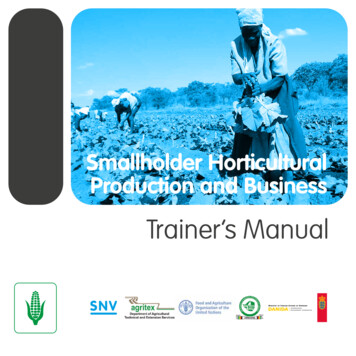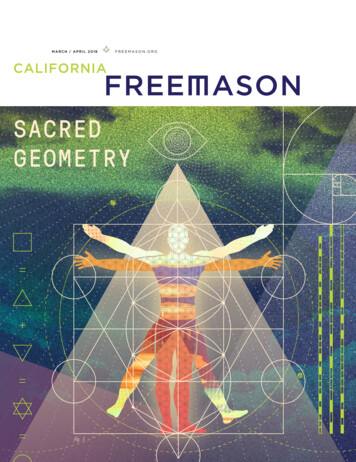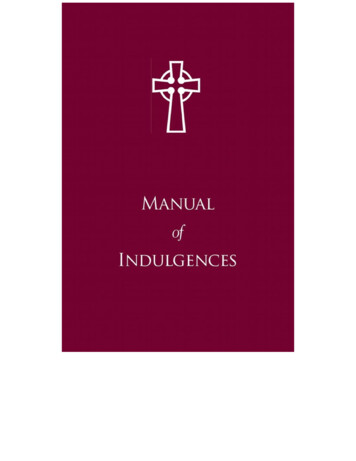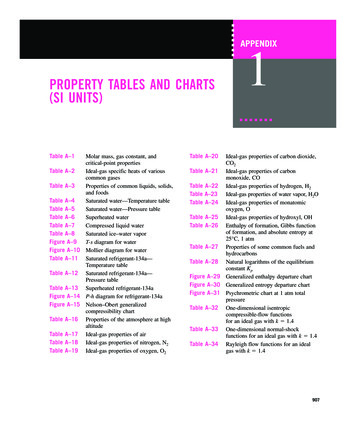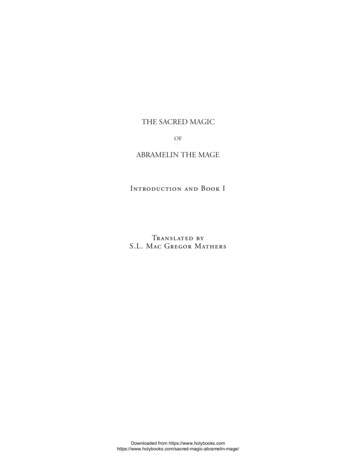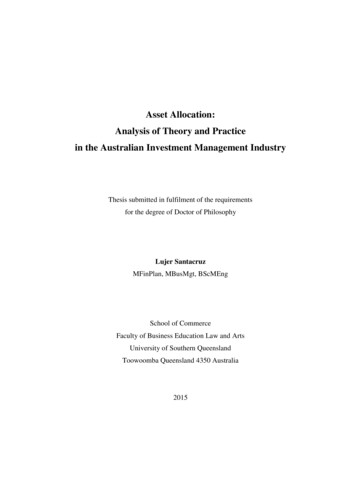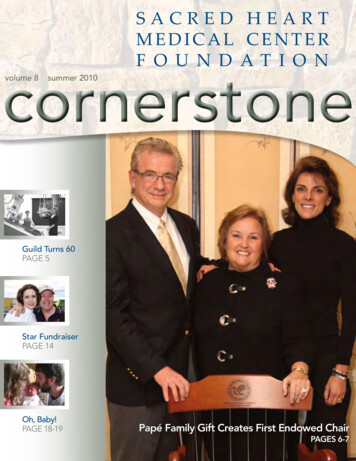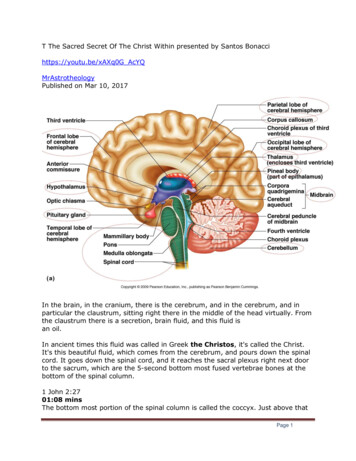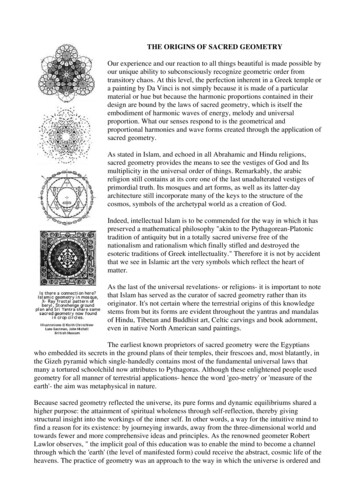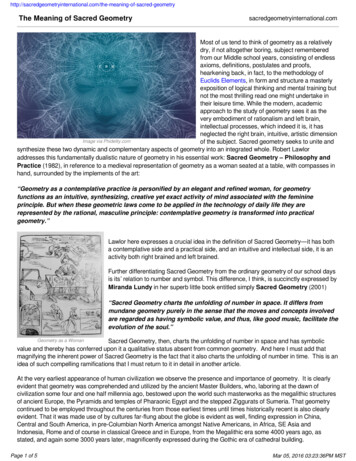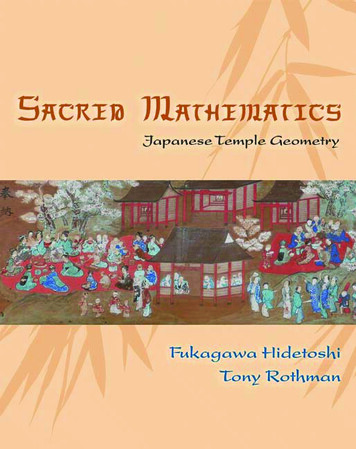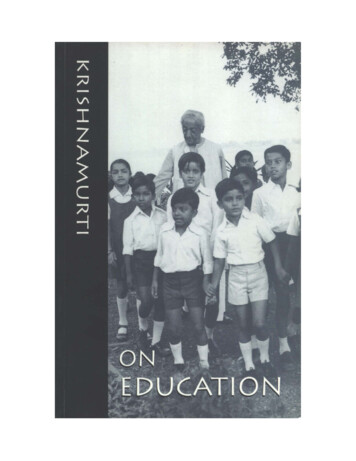
Transcription
Table Of ContentForeword .3- Talks to Students -.6Chapter 1 On Education.6Chapter 2 On The Religious Mind And The Scientific Mind .14Chapter 3 On Knowledge And Intelligence.17Chapter 4 On Freedom And Order .24Chapter 5 On Sensitivity.30Chapter 6 On Fear.36Chapter 7 On Violence .44Chapter 8 On Image-Making .51Chapter 9 On Behaviour .58- Talks to Teachers - .64Chapter 1 On Right Education.64Chapter 2 On The Long Vision.73Chapter 3 On Action .79Chapter 4 On The True Denial .85Chapter 5 On Competition.93Chapter 6 On Fear.99Chapter 7 On Teaching And Learning.107Chapter 8 On The Good Mind .116Chapter 9 On The Negative Approach .123Chapter 10 On Flowering .132Chapter 11 On Meditation And Education .1422
ForewordThis book is the outcome of talks and discussions held in India by J.Krishnamurti with the students and teachers of schools at Rishi Valley School inAndhra Pradesh and Rajghat School at Varanasi. These centres are run by theKrishnamurti Foundation India, which was set up to create a milieu where theteachings of Krishnamurti could be communicated to the child. Krishnamurtiregards education as of prime significance in the communication of that which iscentral to the transformation of the human mind and the creation of a new culture.Such a fundamental transformation takes place when the child, while beingtrained in various skills and disciplines, is also given the capacity to be awake tothe processes of his own thinking, feeling and action. This alertness makes himself-critical and observant and thus establishes an integrity of perception,discrimination and action, crucial to the maturing within him of a right relationshipto man, to nature and to the tools man creates.There is a questioning today of the basic postulates of the educationalstructure and its various systems in India and in the rest of the world. At all levelsthere is a growing realization that the existing models have failed and that there isa total lack of relevance between the human being and the complex,contemporary society. The ecological crisis and increasing poverty, hunger andviolence, are forcing man inevitably to face the realities of the human situation. Ata time like this, a completely new approach to the postulates of education isnecessary. Krishnamurti questions the roots of our culture. His challenge isaddressed not only to the structure of education but to the nature and quality ofman's mind and life. Unlike all other attempts to salvage or suggest alternatives tothe educational system, Krishnamurti's approach breaks through frontiers ofparticular cultures and establishes an entirely new set of values, which in turn cancreate a new civilization and a new society.3
To Krishnamurti a new mind is only possible when the religious spirit and thescientific attitude form part of the same movement of consciousness - a statewhere the scientific attitude and the religious spirit are not two parallel processesor capacities of the mind. They do not exist in watertight compartments as twoseparate movements that have to be fused but are a new movement inherent inintelligence and in the creative mind.Krishnamurti talks of two instruments available to the human being - theinstrument of knowledge which enables him to gain mastery over technical skills,and intelligence which is born of observation and self-knowing.While Krishnamurti gives emphasis to the cultivation of the intellect, thenecessity to have a sharp, clear, analytical and precise mind, he lays far greaterstress on a heightened critical awareness of the inner and outer world, a refusalto accept authority at any level and a harmonious balance of intellect andsensitivity. To discover the areas where knowledge and technical skills arenecessary and where they are irrelevant and even harmful, is to Krishnamurti oneof the fundamental tasks of education, because it is only when the mind learnsthe significance of the existence of areas where knowledge is irrelevant that atotally new dimension is realized, new energies generated and the unusedpotentialities of the human mind activated.One of the unsolved problems and challenges to educationists all over theworld is the problem of freedom and order. How is a child, a student, to grow infreedom and at the same time develop a deep sense of inner order. Order is thevery root of freedom. Freedom, to Krishnamurti, has no terminal point but isrenewed from moment to moment in the very act of living. In these pages, onecan get a glimpse, a feel, of this quality of freedom of which order is an inherentpart.The years which a student spends in a school must leave behind in him afragrance and delight. This can only happen when there is no competition, no4
authority, when teaching and learning is a simultaneous process in the present,where the educator and the educated are both participating in the act of learning.Unlike the communication of the religious spirit by various sects and religiousgroups, Krishnamurti's approach is in a sense truly secular and yet has a deeplyreligious dimension. There is a departure in Krishnamurti's teachings from thetraditional approach of the relationship between the teacher and the taught, theguru and the shishya. The traditional approach is basically hierarchical; there isthe teacher who knows and the student who does not know and has to be taught.To Krishnamurti, the teacher and the student function at the same level communicating through questioning and counter-questioning till the depths of theproblem are exposed and understanding is revealed, illuminating the mind ofboth.The Krishnamurti Foundation India feels deeply privileged for being able tooffer this book to the student and the educator.The Editors5
- Talks to Students -Chapter 1 On EducationYou know, you live in one of the most beautiful valleys I have seen. It has aspecial atmosphere. Have you noticed, especially in the evenings and earlymornings, a quality of silence which permeates, which penetrates the valley?There are around here, I believe, the most ancient hills in the world and man hasnot spoilt them yet; and wherever you go, in cities or in other places, man isdestroying nature, cutting down trees to build more houses, polluting the air withcars and industry. Man is destroying animals; there are vert few tigers left. Man isdestroying everything because more and more people are born and they musthave more space. Gradually, man is spreading destruction all over the world. Andwhen one comes to a valley like this - where there are very few people, wherenature is still not spoilt, where there is still silence, quietness, beauty - one isreally astonished. Every time one comes here one feels the strangeness of thisland, but probably you have become used to it. You do not look at the hills anymore, you do not listen to the birds any more and to the wind among the leaves.So you have gradually become indifferent.Education is not only learning from books, memorizing some facts, but alsolearning how to look, how to listen to what the books are saying, whether they aresaying something true or false. All that is part of education. Education is not justto pass examinations, take a degree and a job, get married and settle down, butalso to be able to listen to the birds, to see the sky, to see the extraordinarybeauty of a tree, and the shape of the hills, and to feel with them, to be really,directly in touch with them. As you grow older, that sense of listening, seeing,unfortunately disappears because you have worries, you want more money, abetter car, more children or less children. You become jealous, ambitious,greedy, envious; so you lose the sense of the beauty of the earth. You know whatis happening in the world. You must be studying current events. There are wars,6
revolts, nation divided against nation. In this country too there is division,separation, more and more people being born, poverty, squalor and completecallousness. Man does not care what happens to another so long as he isperfectly safe. And you are being educated to fit into all this. Do you know theworld is mad, that all this is madness - this fighting, quarrelling, bullying, tearing ateach other? And you will grow up to fit into this. Is this right, is this what educationis meant for, that you should willingly or unwillingly fit into this mad structurecalled society? And do you know what is happening to religions throughout theworld? Here also man is disintegrating, nobody believes in anything any more.Man has no faith and religions are merely the result of a vast propaganda.Since you are young, fresh, innocent, can you look at all the beauty of theearth, have the quality of affection? And can you retain that? For if you do not, asyou grow up, you will conform, because that is the easiest way to live. As yougrow up, a few of you will revolt, but that revolt too will not answer the problem.Some of you will try to run away from society, but that running away will have nomeaning. You have to change society, but not by killing people. Society is youand I. You and I create the society in which we live. So you have to change. Youcannot fit into this monstrous society. So what are you going to do?And you, living in this extraordinary valley, are you going to be thrown into thisworld of strife, confusion, war, hatred? Are you going to conform, fit in, accept allthe old values? You know what these values are - money, position, prestige,power. That is all man wants and society wants you to fit into that pattern ofvalues. But if you now begin to think, to observe, to learn, not from books, butlearn for yourself by watching, listening to everything that is happening aroundyou, you will grow up to be a different human being - one who cares, who hasaffection, who loves people. Perhaps if you live that way, you might find a trulyreligious life.7
So look at nature, at the tamarind tree, the mango trees in bloom, and listen tothe birds early in the morning and late in the evening. See the clear sky, the stars,how marvellously the sun sets behind those hills. See all, the colours, the light onthe leaves, the beauty of the land, the rich earth. Then having seen that and seenalso what the world is, with all its brutality, violence, ugliness, what are you goingto do?Do you know what it means to attend, to pay attention? When you payattention, you see things much more clearly. You hear the bird singing muchmore distinctly. You differentiate between various sounds. When you look at atree with a great deal of attention, you see the whole beauty of the tree. You seethe leaves, the branch, you see the wind playing with it. When you pay attention,you see extraordinarily clearly. Have you ever done it? Attention is somethingdifferent from concentration. When you concentrate, you don't see everything. Butwhen you are paying attention, you see a great deal. Now, pay attention. Look atthat tree and see the shadows, the slight breeze among the leaves. See theshape of the tree. See the proportion of the tree in relation to other trees. See thequality of light that penetrates through the leaves, the light on the branches andthe trunk. See the totality of the tree. Look at it that way, because I am going totalk about something to which you have to pay attention. Attention is veryimportant, in the class, as well as when you are outside, when you are eating,when you are walking. Attention is an extraordinary thing.I am going to ask you something. Why are you being educated? Do youunderstand my question? Your parents send you to school. You attend classes,you learn mathematics, you learn geography, you learn history. Why? Have youever asked why you want to be educated, what is the point of being educated?What is the point of your passing examinations and getting degrees? Is it to getmarried, get a job and settle down in life as millions and millions of people do? Isthat what you are going to do, is that the meaning of education? Do youunderstand what I am talking about? This is really a very serious question. The8
whole world is questioning the basis of education. We see what education hasbeen used for. Human beings throughout the world - whether in Russia or inChina or in America or in Europe or in this country - are being educated toconform, to fit into society and into their culture, to fit into the stream of social andeconomic activity, to be sucked into that vast stream that has been flowing forthousands of years. Is that education, or is education something entirelydifferent? Can education see to it that the human mind is not drawn into that vaststream and so destroyed; see that the mind is never sucked into that stream; sothat, with such a mind, you can be an entirely different human being with adifferent quality to life? Are you going to be educated that way? Or are you goingto allow your parents, society, to dictate to you so that you become pad of thestream of society? Real education means that a human mind, your mind, not onlyis capable of being excellent in mathematics, geography and history, but also cannever, under any circumstances, be drawn into the stream of society. Becausethat stream which we call living, is very corrupt, is immoral, is violent, is greedy.That stream is our culture. So, the question is how to bring about the right kind ofeducation so that the mind can withstand all temptations, all influences, thebestiality of this civilization and this culture. We have come to a point in historywhere we have to create a new culture, a totally different kind of existence, notbased on consumerism and industrialization, but a culture based upon a realquality of religion. Now how does one bring about, through education, a mind thatis entirely different, a mind that is not greedy, not envious? How does one createa mind that is not ambitious, that is extraordinarily active, efficient; that has a realperception of what is true in daily life which is after all religion.Now, let us find out what is the real meaning and intention of education. Canyour mind, which has been conditioned by society, the culture in which you havelived, be transformed through education so that you will never under anycircumstances enter the stream of society? Is it possible to educate youdifferently? Educate' in the real sense of that word; not to transmit from the9
teachers to the students some information about mathematics or history orgeography, but in the very instruction of these subjects to bring about a change inyour mind. Which means that you have to be extraordinarily critical. You have tolearn never to accept anything which you yourself do not see clearly, never torepeat what another has said.I think you should put these questions to yourself, not occasionally, but everyday. Find out. Listen to everything, to the birds, to that cow calling. Learn abouteverything in yourself, because if you learn from yourself about yourself, then youwill not be a secondhand human being. So you should, if I may suggest, fromnow on, find out how to live entirely differently and that is going to be difficult, for Iam afraid most of us like to find an easy way of living. We like to repeat and whatother people say, what other people do, because it is the easiest way to live - toconform to the old pattern or to a new pattern. We have to find out what it meansnever to conform and what it means to live without fear. This is your life, andnobody is going to teach you, no book, no guru. You have to earn from yourself,not from books. There is a great deal to learn about yourself. It is an endlessthing, it is a fascinating thing, and when you learn about yourself from ourself, outof that learning wisdom comes. Then you can live a most extraordinary, happy,beautiful life. Right? Now, will you ask me questions?Student: The world is full of callous people, indifferent people, cruel people,and how can you change those people?Krishnamurti: The world is full of callous people, indifferent people, cruelpeople, and how can you change those people? Is that it? Why do you botherabout changing others? Change yourself. Otherwise as you grow up you will alsobecome callous. You will also become indifferent. You will also become cruel.The past generation is vanishing, it is going, and you are coming, and if you alsoprove callous, indifferent, cruel, you will also build the same society. Whatmatters is that you change, that you are not callous, that you are not indifferent.10
When you say all this is the business of the older generation, have you seenthem, have you watched them, have you felt for them? If you have, you will dosomething. Change yourself and test it by action. Such action is one of the mostextraordinary things. But we want to change everybody except ourselves, whichmeans, really, we do not want to change, we want others to change, and so weremain callous, indiffer- ent, cruel, hoping the environment will change so that wecan continue in our own way. You understand what I am talking about?Student: You ask us to change, what do we change into?Krishnamurti: You ask us to change, what is it we change into? You cannotchange into a monkey, probably you would like to, but you cannot. Now when yousay, "I want to change into something" - listen to this carefully - if you say toyourself, "I must change, I must change myself into something", the "intosomething" is a pattern which you have created, haven't you? Do you see that?Look, you are violent or greedy and you want to change yourself into a personwho is not greedy. Not wanting to be greedy is another form of greed, isn't it? Doyou see that? But if you say, "I am greedy, I will find out what it means, why I amgreedy, what is involved in it", then, when you understand greed, you will be freeof greed. Do you understand what I am talking about?Let me explain. I am greedy and I struggle, fight, make tremendous efforts notto be greedy. I have already an idea, a picture, an image of what it means not tobe greedy. So I am conforming to an idea which I think is non-greed. Youunderstand? Whereas if I look at my greed, if I understand why I am greedy, thenature of my greed, the structure of greed, then, when I begin to understand allthat, I am free of greed. Therefore, freedom from greed is something entirelydifferent from trying to become non-greedy. Do you see the difference? Freedomfrom greed is something which is entirely different from saying, "I must be a greatman so I must be non-greedy?" Have you understood? I was thinking last night,that I have been to this valley, off and on, for about forty years. People have11
come and gone. Trees have died and new trees have grown. Different childrenhave come, passed through his school, have become engineers, housewives anddisappeared altogether into the masses. I meet them occasionally, at an airport orat a meeting, very ordinary people. And if you are not very careful, you are alsogoing to end up that way.Student: What do you mean by ordinary?Krishnamurti: To be like the rest of men; with their worries, with theircorruption, violence, brutality, indifference, callousness. To want a job, to want tohold on to a job, whether you are efficient or not, to die in the job. That is what iscalled ordinary - to have nothing new, nothing fresh, no joy in life, never to becurious, intense, passionate, never to find out, but merely to conform. That iswhat I mean by ordinary. It is called being bourgeois. It is a mechanical way ofliving, a routine, a boredom.Student: How can we get rid of being ordinary?Krishnamurti: How can you get rid of being ordinary? Do not be ordinary. Youcannot get rid of it. Just do not be it.Student: How, Sir?Krishnamurti: There is no "how". You see that is one of the most destructivequestions: "Tell me how"? Man has always been saying, throughout the world,"Tell me how". If you see a snake, a poisonous cobra, you do not say, "Please tellme how to run away from it". You run away from it. So in the same way, if yousee that you are ordinary, run, leave it, not tomorrow, but instantly. Since you willnot ask any more questions. I am going to propose something. You know peopletalk a great deal about meditation, don't they?Student: They do.12
Krishnamurti: You know nothing about it. I am glad. Because you knownothing about it, you can learn about it. It is like not knowing French or Latin orItalian. Because you do not know, you can learn, you can learn as though for thefirst time. Those people who already know what meditation is, they have tounlearn and then learn. You see the difference? Since you do not know whatmeditation is, let us learn about it. To learn about meditation, you have to seehow your mind is working. You have to watch, as you watch a lizard going by,walking across the wall. You see all its four feet, how it sticks to the wall, and asyou watch, you see all the movements. In the same way, watch your thinking. Donot correct it. Do not suppress it. Do not say, "All this is too difficult". Just watch;now, this morning.First of all sit absolutely still. Sit comfortably, cross your legs, sit absolutelystill, close your eyes, and see if you can keep your eyes from moving. Youunderstand? Your eye balls are apt to move, keep them completely quiet, for fun.Then, as you sit very quietly, find out what your thought is doing. Watch it as youwatched the lizard. Watch thought, the way it runs, one thought after another. Soyou begin to learn, to observe.Are you watching your thoughts - how one thought pursues another thought,thought saying, "This is a good thought, this is a bad thought"? When you go tobed at night, and when you walk, watch your thought. Just watch thought, do notcorrect it, and then you will learn the beginning of meditation. Now sit very quietly.Shut your eyes and see that the eyeballs do not move at all. Then watch yourthoughts so that you learn. Once you begin to learn there is no end to learning.13
Talk To StudentsChapter 2 On The Religious Mind And The ScientificMindEarly this morning I saw a beautiful bird, a black bird with a red neck. I do notknow what the bird is called. It was flying from tree to tree and there was a songin its heart, and it was a lovely thing to behold. I would like this morning to talk toyou of a rather serious matter. You should listen carefully and if you want to,perhaps later on, you may be able to discuss it with your teachers. I want to talkabout something which concerns the whole world, about which the whole world isdisturbed. It is the question of the religious spirit and the scientific mind. Thereare these two attitudes in the world. These are the only two states of mind thatare of value, the true religious spirit and the true scientific mind. Every otheractivity is destructive, leading to a great deal of misery, confusion and sorrow.The scientific mind is very factual. Discovery is its mission, its perception. Itsees things through a microscope, through a telescope; everything is to be seenactually as it is; from that perception, science draws conclusions, builds uptheories. Such a mind moves from fact to fact. The spirit of science has nothing todo with individual conditions, with nationalism, with race, with prejudice. Scientistsare there to explore matter, to investigate the structure of the earth and of thestars and the planets, to find out how to cure man's diseases, how to prolongman's life, to explain time, both the past and the future. But the scientific mindand its discoveries are used and exploited by the nationalistic mind, by the mindthat is India, by the mind that is Russia, by the mind that is America. Scientificdiscovery is utilized and exploited by sovereign states and continents.Then there is the religious mind, the true religious mind that does not belongto any cult, to any group, to any religion, to any organized church. The religious14
mind is not the Hindu mind, the Christian mind, the Buddhist mind, or the Muslimmind. The religious mind does not belong to any group which calls itself religious.The religious mind is not the mind that goes to churches, temples, mosques. Noris it a religious mind that holds to certain forms of beliefs, dogmas. The religiousmind is completely alone. It is a mind that has seen through the falsity ofchurches, dogmas, beliefs, traditions. Not being nationalistic, not beingconditioned by its environment, such a mind has no horizons, no limits. It isexplosive, new, young, fresh, innocent. The innocent mind, the young mind, themind that is extraordinarily pliable, subtle, has no anchor. It is only such a mindthat can experience that which you call God, that which is not measurable.A human being is a true human being when the scientific spirit and the truereligious spirit go together. Then human beings will create a good world - not theworld of the communist or the capitalist, of Brahmins, or of Roman Catholics. Infact the true Brahmin is the person who does not belong to any religious creed,has no class, no authority; no position in society. He is the true Brahmin, the newhuman being, who combines both the scientific and the religious mind, andtherefore is harmonious without any contradiction within himself. And I think thepurpose of education is to create this new mind, which is explosive, and does notconform to a pattern which society has set.A religious mind is a creative mind. It has not only to finish with the past butalso to explode in the present. And this mind - not the interpreting mind of books,of the Gita, the Upanishads, the Bible - which is capable of investigating, is alsocapable of creating an explosive reality. There is no interpretation here nordogma.It is extraordinarily difficult to be religious and to have a clear and precise,scientific mind, to have a mind that is not afraid, that is unconcerned with its ownsecurity, its own fears. You cannot have a religious mind without knowingyourself, without knowing all about yourself - your body, your mind, your15
emotions, how the mind works, how thought functions. And to go beyond all that,to uncover all that, you must approach it with a scientific mind which is precise,clear, un-prejudiced, which does not condemn, which observes, which sees.When you have such a mind you are really a cultured human being, a humanbeing who knows compassion. Such a human being knows what it is to be alive.How does one bring this about? For it is imperative to help the student to bescientific, to think very clearly, precisely, to be sharp, as well as to help himuncover the depths of his mind, to go beyond words, his various labels as theHindu, Muslim, Christian. Is it possible to educate the student to go beyond alllabels and find out, experience that something which is not measured by themind, which no books contain, to which no guru can lead you? If such aneducation is possible in a school like this, it will be remarkable. You must all seethat it is worthwhile to create such a school. That is what the teachers and I havebeen discussing for some days. We have talked of a great many things - aboutauthority, about discipline, how to teach, what to teach, what listening is, whateducation is, what culture is, how to sit still. Merely to pay attention to dance, tosong, to arithmetic, to lessons, is not the whole of life. It is also part of life to sitstill and look at yourself, to have insight, to see. It is also necessary to observehow to think, what to think and why you are thinking. It is also part of life to look atbirds, to watch the village people, their squalor - which each one of us hasbrought about, which society maintains. All this is part of education.16
Talk To StudentsChapter 3 On Knowledge And IntelligenceYou are here to gather knowledge - historical, biological, linguistic,mathematical, scientific, geographical, and so on. Apart from the knowledge thatyou acquire here, there is collective knowledge, the knowledge of the race, ofyour grandfathers, of
Krishnamurti with the students and teachers of schools at Rishi Valley School in Andhra Pradesh and Rajghat School at Varanasi. These centres are run by the Krishnamurti Foundation India, which was set up to create a milieu where the teachings of Krishnamurti could be
